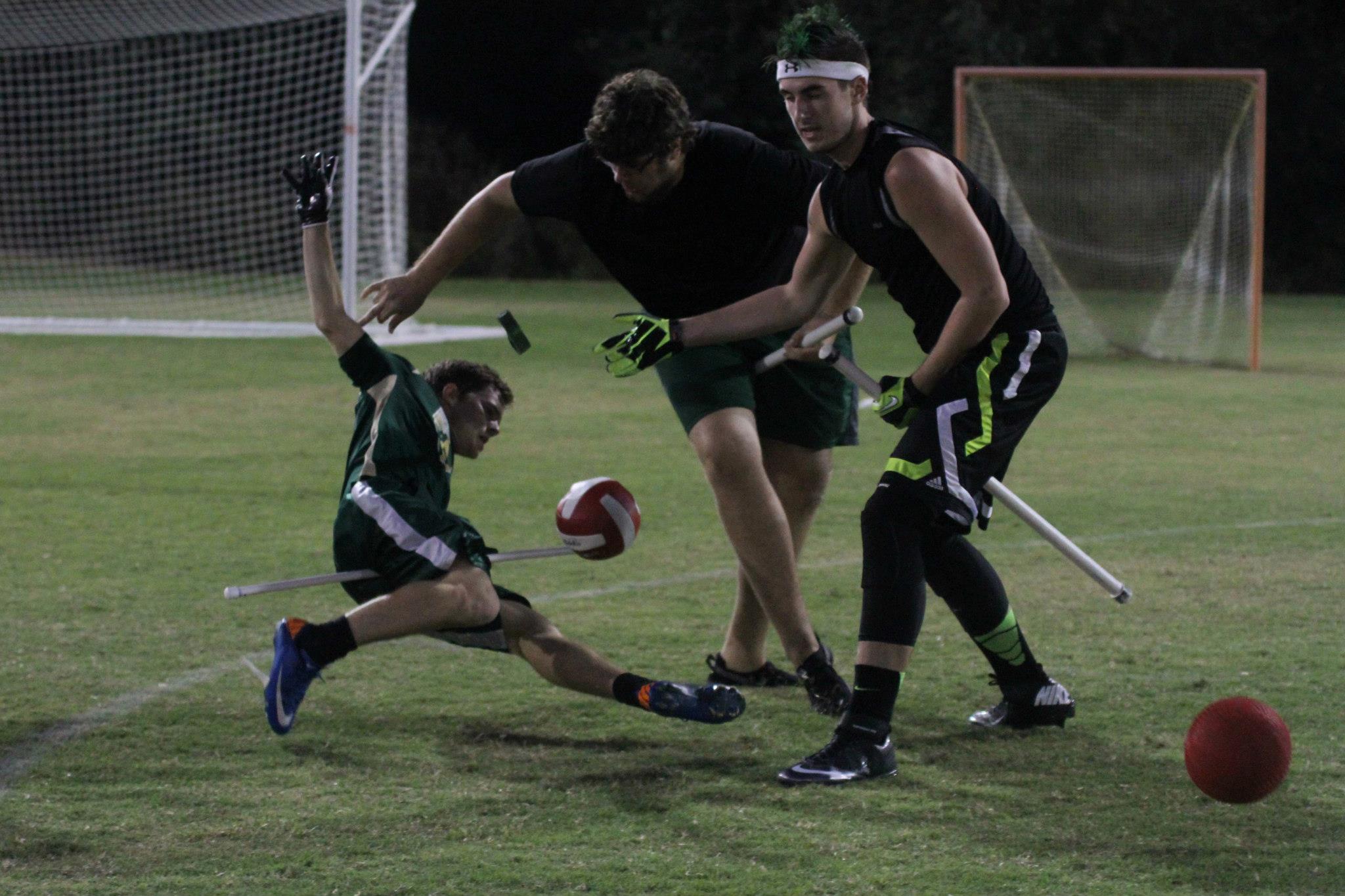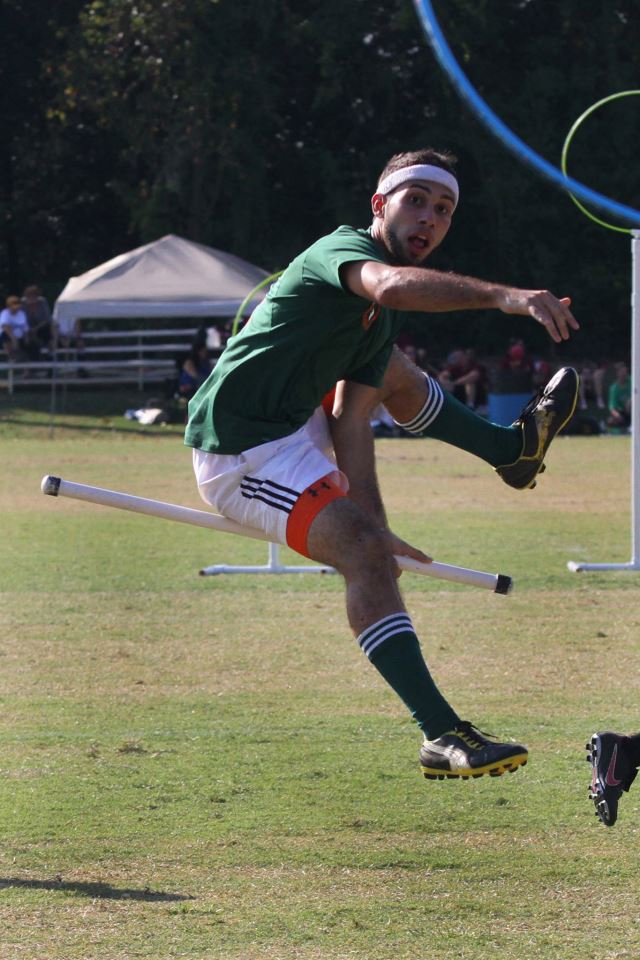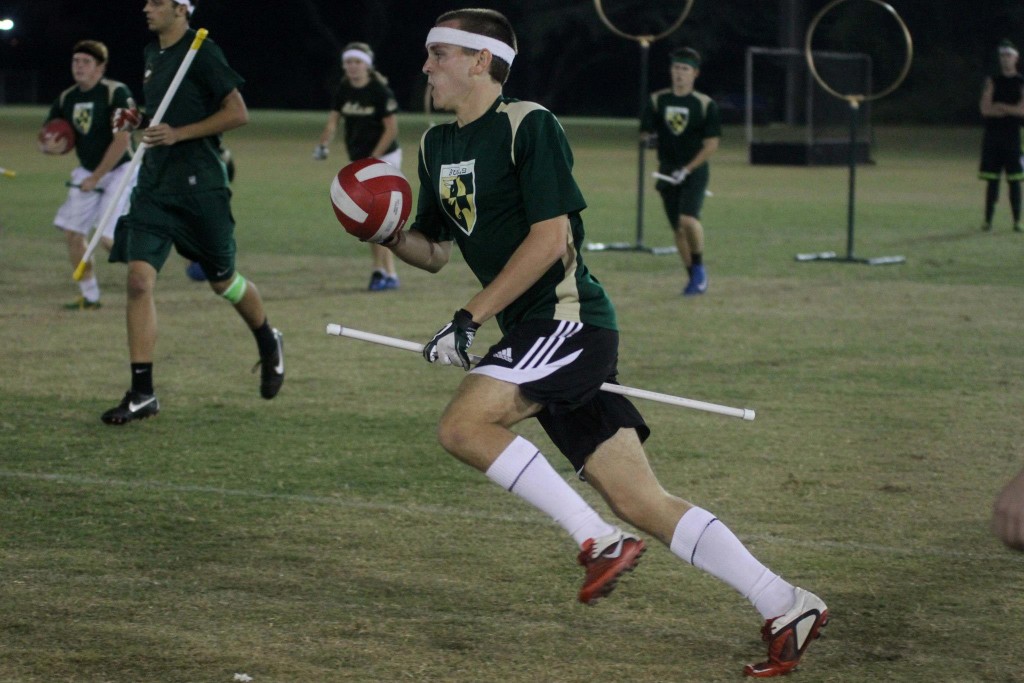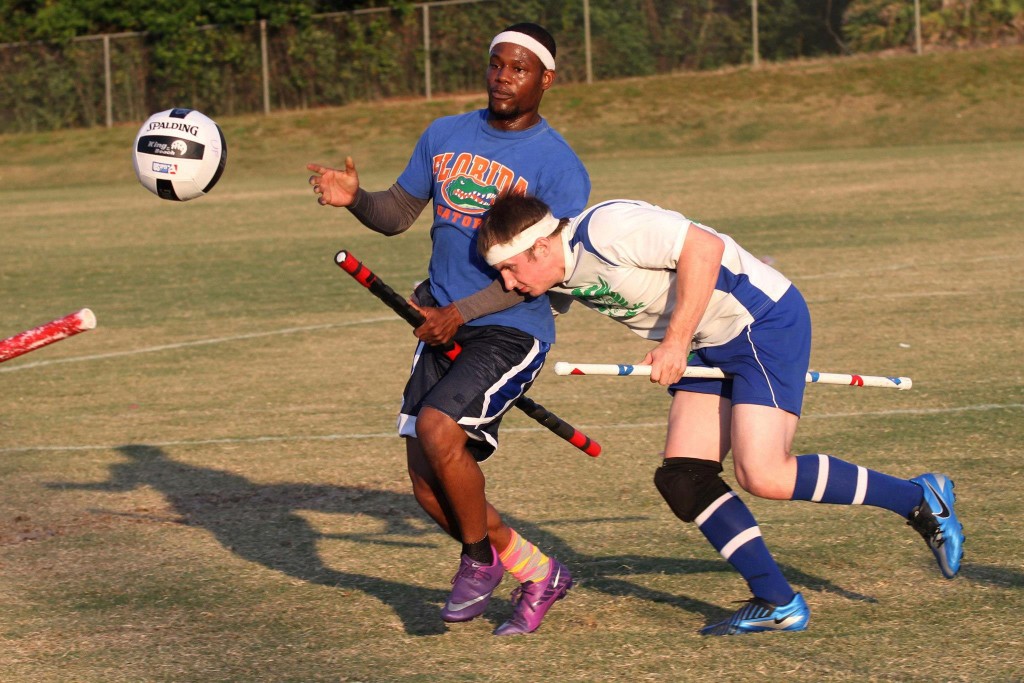- Rule, Britannia, no more?
- Unpopular Opinions: US Quadball Cup 2023
- Proven Contenders: University of Virginia
- Proven Contenders: Rutgers University
- Proven Contenders: University of Michigan
- Proven Contenders: Creighton University
- Different Perspectives: A Look Inside USA Ultimate
- Antwerp QC, Much of Belgian Core, Leaves Competitive Quidditch
Southern Regional Preview
- Updated: March 1, 2013

What is the Southern Region?
The Southern Region is a quiet-but-vibrant quidditch faction composed of two conferences, in the southern and eastern areas of the region, and a handful of other teams in the middle and western sections. Traditionally, the region tends to play the other teams closer to or within their borders, shying away from outside competition in favor of an organized local schedule of games, allowing for a large amount of games at a relatively low cost.
As a result of these frequent games, the conferences have become a hotspot for strategy. Teams constantly test, redesign and retest different ideas. As a result, both the Carolina Quidditch Conference and the Florida Quidditch Conference have developed swiftly and independently. Regional strength according to the two inter-regional tournaments played this season is heavily weighted in favor of the Florida Quidditch Conference. In the recent Rocky Top Tournament, Florida State managed to allow a grand total of 40 points, carry every team well out of snitch range, and catch every snitch. But, in the most recent FQC tournament, Florida State was only placing in the middle of the Florida teams.
While we don’t know the exact details of how every team would matchup, it’s safe to assume that, at least for now, Florida remains the crème of the crop in the region. And with FSU as really only the state’s fifth-best squad, the pickings may be slim for the rest of the region. Who has the best shot at the title, and who will grab those last few spots? Let’s find out.
The Favorites
University of Miami
Going into the tournament undefeated in the region, and having won the last two Southern Regional Championships at University of Florida’s Swamp Cup, the University of Miami is a major threat. Their combination of experience, skill, and a relentless, break-neck pace have helped them dominate their opponents time and time again. Charging forward with the raw skill of their chasers, Miami’s biggest strengths are its speed, which the team use to outrun any opposing defense, and an affinity for surrounding the hoops with ready and capable chasers. Largely considered to be the top team in the region, they will look to live up to the hype this weekend.

Sean Pagoada has been USF’s loss and Miami’s giant gain since transferring teams at the start of the season. Credit: April Stratemeyer
The Contenders
University of South Florida
The Bulls have a long and storied past when it comes to team composition. Every other tournament, they seem to have a different strategy based on different players. This variability has led to a flexibility that has, in turn, led to a knowledge team.

Blain Falone is one of many elite, athletic chasers that have helped make USF a power in the region. Credit: April Stratemeyer
Somehow, regardless of the players present, their core stays strong. While they faced an identity crisis with team USA chaser Sean Pagoada and team USA reserve chaser Sean Snipes both leaving the team, different chasers and specifically a fantastic beater core stepped up. This particularly dominant beater core has allowed USF to almost constantly retain bludger control.
Strategy for USF depends on who they want to play. They have the speed for fast breaks, the catching to depend on passes, the muscle to power through a defense, or the height to just hang around the hoops. Their strategy will depend on the players they have present, but expect to see this team retain bludger control for the majority of their games, and use that to grind out advantages. Expect a finals appearance from this club.
Ringling College
If any team is willing to fight tooth and nail to earn a World Cup spot, it is Ringling School of Art and Design. As one of the oldest teams outside of the Northeast, Ringling has been attending World Cups longer than most of the quidditch clubs in Florida have existed. Their experience and dedicated personal make for a fantastic team composition. In game, World Cup snitch Bryan Bae uses his athleticism to be a jaw dropping beater and seeker, but Ringling is hardly a one man team. Ringling has both height and athleticism in their arsenal, and with clutch wins this season over all but USF and Miami, Ringling has a serious shot at a top seed.
University of Florida
Well known in the quidditch world for clinching a second place finish at World Cup V, University of Florida has retained the majority of their squad, but have stumbled this season largely due to issues in leadership. A lack of chemistry and coherent strategy has led to ugly losses to Miami and USF that brought rise to questions about their elite status in the region. That said, if they can put it together, get their best players on the field, and make the right decisions, UF will easily walk out with a world cup position.

With much of their World Cup Finals squad still together, all it would take is the right chemistry for the team to threaten for the Regional title. Credit: April Stratemeyer
The Bubble
University of South Carolina
A team with a strong showing in the Carolina Quidditch Conference, USC will be making first major IQA appearance in these regionals. Currently ranked 4th in the Carolina Quidditch Conference, their strategies focus on team work rather than individual brute strength. They have solid conditioning, which translates to impressive endurance, and while a few players are entirely new to the sport, if they can overcome pre-tournament nerves, they could prove to be a contender for a spot.
University of Southern Mississippi
Southern Miss utilizes a vastly different strategy than other teams in the region, preferring to advance up the field in a phalanx of sorts, surrounding the ball carrier with chasers to push people out of his way. It will be up to the rest of the region to deal with a style that they have likely never seen before.
Teams that prefer to up the tempo of the game will have to deal with a USM default to a fast play strategy should beware, as USM slows the game down drastically. With excellently conditioned players, Southern Miss can be expected to be a tireless force in the tournament. And their experience playing with teams from the Southwest Region will likely be invaluable as they go up against the South’s elite.
Florida State University
While they may be one of the youngest teams in the FQC, Florida State has managed to put on an impressive show of strength at the most recent tournaments. They have come within snitch range of top-tier Florida teams, and have the leadership and talent in place to make a serious run at a world cup spot. FSU has a few very physical female players and a very solid male contingent. They are overall more of a team than a group of individuals. If that team can pull together, expect a trip to Orlando in their future.
Florida Atlantic University
This young Florida team has promise in a few members of their beater and chaser core. Though they have had a relatively low-scoring series of games at their last few meets, Florida Atlantic University have the ability to put points up against nearly any team. Their biggest issue has been depth and endurance. Their chasers and beaters get worn out after a few drives, and tend to not excel in lengthy games. If they can somehow manage to keep games short, they may be able to be contenders.
The Underdogs
College of Charleston
A stable force in Southern Quidditch, College of Charleston has not played a Floridian team since the first Southern Regional tournament. In their tenure as a quidditch team, they have built up a reputation for being a hard-hitting side. If they manage to maintain bludger control, this should help shape their defense to become something of a contending factor.
Tennessee Tech University
Tennessee Tech is entering the tournament without much experience playing other teams, having only played six ranked matches. But don’t let that fool you into thinking they’ll be easy pickings. Their chaser core utilizes their size and strength to put together a stout defense and a slow paced, bruising offense that could easily throw teams out of rhythm. This team has flown under the radar all season, but has the potential to upset some established Florida sides.
Brevard Community College
Brevard is one of the newest teams in the region, having been founded at the beginning of the year. They struggled early in the season against established teams, but have been steadily gaining their bearings and improving on the pitch. Their leaders did not hesitate to jump right in with captains from other teams and start talking about how to improve. Given time, this team could end up regularly holding their own against anybody else in the region. Don’t be surprised if they walk away from the Regional Championship with even more passion and energy than when they arrive, ready to get back to work trying new things.
Florida International University
Struggling to maintain a steady roster, FIU has had spotty attendance at tournaments. With nearly an entirely revamped line-up, the team is something of a wild card. Boasting some quality athletes, FIU’s success may be based upon their ability to score on teams simply by wearing them down. Having few ranked match appearances with their new roster, their numerous unknown variables could prove lethal if the team can overcome a lack of experience, play time and chemistry. Unless they bring out something special though, they likely will fall short of a World Cup bid.
Winthrop University
Able to hold their own against other CQC teams, Winthrop has depth, speed, and beaters that can maintain get and keep possession. This will be the first time Winthrop has competed at a Southern regional tournament, and they’ll be looking to make a name for themselves.
| Writer | Team 1 | Team 2 | Team 3 | Team 4 | Team 5 | Team 6 |
|---|---|---|---|---|---|---|
| Alan Black | Miami | USF | Ringling | UF | USM | Charleston |
| Benny Nadeau | Miami | USF | Ringling | UF | FSU | USM |
| Curtis Taylor | Miami | USF | Ringling | UF | FSU | Charleston |
| Devin Sandon | Miami | USF | Ringling | UF | FSU | FAU |
| Luke Changet | Miami | USF | Ringling | UF | FSU | USM |
| Kevin Oelze | Miami | USF | Ringling | UF | FSU | FAU |
| Mollie Lensing | Miami | USF | Ringling | UF | FSU | USM |
| Sarah Woolsey | Miami | USF | Ringling | UF | FSU | TTU |
| Writer | Winner | Runner-Up |
|---|---|---|
| Alan Black | Miami | USF |
| Benny Nadeau | UF | Miami |
| Curtis Taylor | USF | Miami |
| Devin Sandon | Miami | USF |
| Kevin Oelze | Miami | USF |
| Luke Changet | Miami | USF |
| Mollie Lensing | Miami | USF |
| Sarah Woolsey | Miami | USF |
(Eric Schnier contributed reporting to this article.)

One Comment